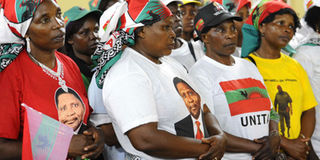Angola tallies ballots with Dos Santos tipped to win

National Union for the Total Independence of Angola (UNITA) supporters listen to a speech of their leader Isaias Samakuva (unseen) during the final rally campaign on August 29, 2012 in Luanda. Angola tallied ballots September 1, 2012 from its second peacetime elections, expected to keep President Jose Eduardo dos Santos in power
LUANDA
Angola tallied ballots Saturday from its second peacetime elections, expected to keep President Jose Eduardo dos Santos in power despite demands from the country's poor for a slice of its oil wealth.
The National Electoral Commission said initial results would be announced later Saturday, but Angolans desperate for news on the elections swamped newspaper vendors, elbowing each other to grab a copy of the official Jornal de Angola.
"Many people want to buy the newspaper. Until now, we don't have the results, and everyone wants the results," said Luciano Calongo, 31, as he tussled in a crowd to get a copy off a motorcycle deliveryman in downtown Luanda.
Aside from the jostling around newspaper vendors, the normally vibrant capital Luanda was strangely quiet for a second day. Friday was declared a national holiday for the elections, and shops remained shuttered on Saturday while streets notorious for gridlock were mostly empty.
State television repeated images of people around the country casting ballots at more than 10,000 schools that closed for a month to allow their transformation into polling stations.
"Voting proceeded in an orderly manner across the national territory," proclaimed the front page of the government mouthpiece Jornal de Angola.
Counting began shortly after polls closed Friday, but the process will take several days as results are compiled from across the southern African nation twice the size of France, where some returns have to be physically transported from remote regions.
The ruling People's Movement for the Liberation of Angola (MPLA), in power since independence from Portugal in 1975, took 81 percent of the vote in the last elections in 2008, the first ballot held after the 27-year civil war ended in 2002.
The MPLA is widely expected to win a majority of the 220 seats in parliament. The leader of the winning party will become president, making Dos Santos all but certain to secure another five-year term.
He has already ruled Angola for 33 years, through the devastating civil war and then through an oil boom that over the last decade has transformed the country into one of the world's fastest growing economies.
While his family has built a business empire, he has also ploughed billions of dollars into rebuilding the nation with new roads, schools, bridges and dams rising up from the ruins.
Public health and incomes have improved, but 55 percent of the country still lives in abject poverty, often in shacks without electricity or running water.
Resentment among young Angolans, who enviously eye the luxurious new skyscrapers filling Luanda's skyline, has sparked protests demanding that Dos Santos step down and calling for the nation's oil wealth to be spread more evenly.
Protests in Angola are quickly and violently repressed, but they clearly rattled a government that never allows any show of dissent.
The main opposition Union for the Total Independence of Angola (Unita) accuses Dos Santos of using his power and money to strengthen his power, and has campaigned promising a better democracy.
Unita leader Isaias Samakuva has lambasted the organisation of the elections, citing worries about accreditation of observers and the failure to make a public audit of the 9.7 million names on the voter roll.
With only 10 percent of votes in the last poll, Unita needs a strong showing to prove it remains relevant, particularly after a bruising split that saw a top party official form the new Casa party with a high-profile defector from the MPLA.
Casa has made in-roads among young voters with promises of better jobs and homes, but it is unclear of the party's reach since its creation in April.
Former Cape Verde president Pedro Verona Pires, chief of the African Union's observer team, described the poll's organisation as "satisfactory" and said that initial reports showed the voting had proceeded well.
In 2008, chaos at the polls forced the government to allow a second day of voting. Friday's balloting appeared to go smoothly, and police in Luanda said no incidents had been reported.




